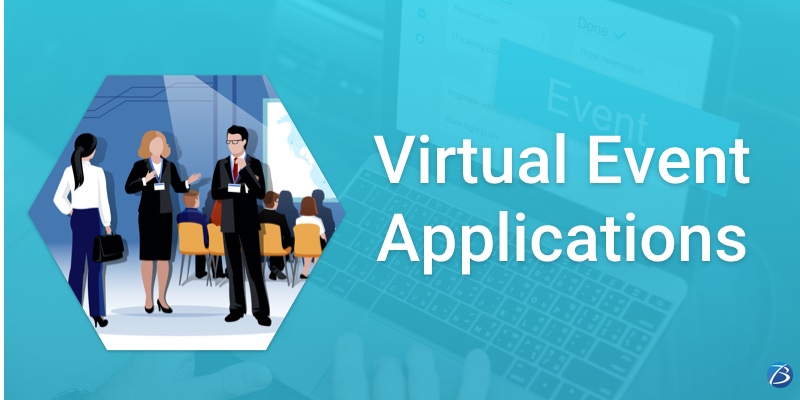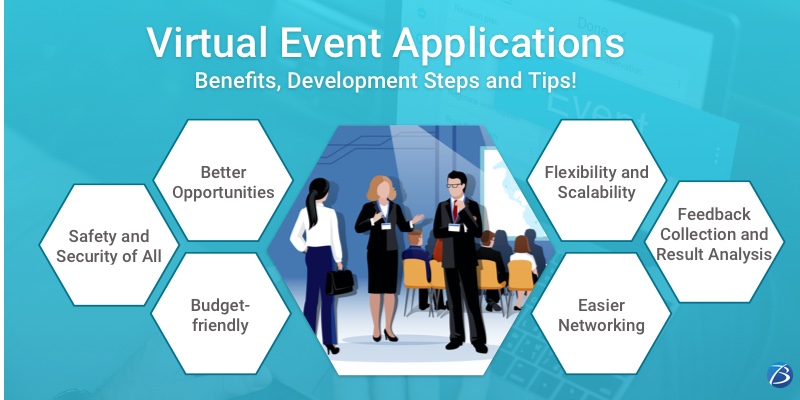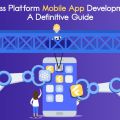Virtual Event Applications: Benefits, Development Steps and Tips!

Owing to the Covid-19 pandemic, thousands of personal as well as corporate events got canceled or postponed, affecting numerous businesses. But then, virtual event applications came into the picture and countless events were conducted through these apps for carrying out personal as well as corporate events. Due to this, several apps got outstanding attention, which were not even known to the masses, and their downloading spiked.
Downloads of video conferencing applications were recorded to be 62 million, just in a single week of March 2020, after the pandemic, according to TechCrunch, the renowned online newspaper for technology news. Since then, a plethora of virtual event apps have been fabricated and the face of online conferencing or virtual event industry has changed forever.
Today, most of the event app development services that has adapted to this online trend are making immense profits from the apps. So, in this blog post, we have shed light on the fundamental steps to create such a next-gen virtual event application. We have also talked about how they prove advantageous to diverse businesses, and their significant features. Let’s commence.
Virtual Event Apps and Their Potential Advantages

What is a virtual event? Well, the events that are hosted online allowing the participants to participate or view the event from any corner of the world are known to be virtual events. These can be webinars, virtual conferences, internal or external hybrid events, etc. Such digital events have some agenda and are usually expected to be collaborative sessions and are streamed online.
Such digital events are hosted using live-streaming platforms called virtual event apps; where live streaming is the essential functionality of these apps. Zoom, Webex, Google Meet, Vimeo, Digitell, GoToMeeting, Intrado, Evia, etc. are a few popular platforms/apps being extensively used.
- Safety and Security of All- During the pandemic, online event apps ensure the health and safety of the participants, event organizers, and all the involved staff, as there is no physical meeting between people and hence social distancing norms are maintained.
- Better Opportunities- All the details like the number of tickets sold out for events, related email marketing reports, etc. are available on a single application. Besides, the participants can access the pre-recorded events, as per their will and availability. Also, they can chat with other users during live events to build business relationships. Such benefits offer extended opportunities to both- app owners as well as participants.
- Budget-friendly- The app owners need to bear only the initial cost of development of the virtual event platform, unlike the offline events. In offline events, the event planners have to consider a host of other costs like the cost of expensive equipments, location, travel expenses, accommodation for participants, lodging, etc. Thus, with virtual apps, the cost of events is drastically reduced making the events much budget-friendly.
- Flexibility and Scalability- Whether a simple sales kickoff meeting, or a thought leadership meeting, or any event for that matter, all types of events can be flexibly hosted using these platforms. Options in multiple languages are also available for inviting guest speakers. Furthermore, users all across the globe can instantly join the meeting at the same time.
- Easier Networking- Participants don’t have to go to a particular place to meet new people. Online chatting options make things much easier. Besides, they can conveniently collect details like the name, profiles, companies, etc. of other professionals in the meeting.
- Feedback Collection and Result Analysis- Virtual event apps allow the participants to provide feedback easily through polls or real-time sessions. This feedback will help in the evaluation of the overall performance of the event, allowing the owners to make future improvements. Also, the insightful data generated using these apps are quite useful for result analysis. Such apps can track data like the number of participants, the timing when they logged in, what amount they paid and how etc.
Top Features of Virtual Event Apps
- Event registration
- Profile creation of the users
- Event page for details like event topic, date and time of the event, host details, etc.
- Speaker booths for multiple speakers to create their profiles and related details
- Facility to record live sessions and meetings
- Real-time chatting, one-to-one, and group chatting options
- Live video streaming option
- Payment options via PayPal, Google Pay, or credit/debit cards, etc.
- Social media integration for sharing event-related data with other contacts
- Integrations like sales tools, email marketing, etc.
- Report generation and analysis
- Other features like screen sharing, virtual hand raising, mute participants, polls, etc.
Steps to Architect a Virtual Event Application
Here are the crucial steps required for the creation of an online conference app:
Development of Backend: In the initial development stages itself, build a server for running the application. It is always advisable to create the server from scratch rather than making use of any ready-made technologies.
Designing User Interface: UI marks the first impressions for your virtual conferencing application and hence, it is of utmost importance to thoughtfully design a captivating and intuitive UI.
Android and iOS Compatibility: If you want to reach a wider audience range, it is essential that your app runs on both- Android and iOS devices. For ensuring that your video streaming app supports Android, make use of WebRTC and for iOS, use Swift.
Next, let us look into the two most important aspects during the development of virtual event app- cloud network and video architecture.
Cloud Network
The virtual conferencing applications come with an integrated data center infrastructure that is strictly supervised, tracked, and regularly modified by the development teams. This cloud network is created for providing global connectivity and for enabling users from all across the globe to connect and participate seamlessly. For example, Zoom has more than 15 data centers globally which are going to be expanding in the coming years.
Video Architecture
Now, the app architecture should be optimized to meet the video requirements for which, four important features must be considered, as given below:
- Distributed architecture: This architecture enables the participants to share meetings across the network and allows them to easily join meetings via private communication using the nearest data center. Using a distributed architecture rather than a centralized approach will offer the required scalability to the app so that thousands of viewers can simultaneously get a consistent video experience.
- Multimedia Routing: This step offers the users with various streams of videos from other participants and also reduces the need for computers’ power and thus, makes the app a greatly scalable system.
- Multi-bitrate Encoding: Every single stream can be altered to several resolutions besides stream routing. Due to this, the need to decode, encode and optimize the output is removed. This also allows the apps to provide video quality levels depending on the network capabilities and the system.
- Service Application Layer: Higher quality of service application layer ensures optimized audio, video, and screen-sharing for every device and the available bandwidth for offering the best network-wide experience.
Concluding Views
During the pandemic, most of the offline events are now being conducted online using the live-streaming event apps. It is very likely that in the future too, several events will be carried out online, owing to the benefits like cost and time-saving and the event app development industry will flourish more than ever. Needless to say, the need for creating live streaming apps will remain higher for years to come.
That’s it for now. Hope you enjoyed reading this post.
Do comment below or drop us a line for further assistance on building virtual events apps.
Other articles and publications:
Articles and publications of other companies:
- +1 (469) 277-0804
- 8305 Tripoli Trl, Frisco, TX 75034, United States
- www.biz4solutions.com/








